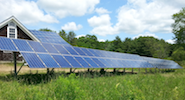Community solar project sparks bigger solarize effort
 Nine Maine families recently flipped the switch on the state’s first member-owned community solar project, known as the Edgecomb solar farm. The 46 kW, 182-panel system was completed through the work of the Twin Village Energy Committee of Damaraiscotta and Newcastle. This group is an offshoot of the Midcoast Green Collaborative.
Nine Maine families recently flipped the switch on the state’s first member-owned community solar project, known as the Edgecomb solar farm. The 46 kW, 182-panel system was completed through the work of the Twin Village Energy Committee of Damaraiscotta and Newcastle. This group is an offshoot of the Midcoast Green Collaborative.
Interest in starting a community solar farm developed from area residents who wanted to go solar on their own homes, but couldn’t because their own roofs weren’t a good fit for it. This group got together in the middle of last year.
Their first challenge was to find a piece of land that would be suitable for the farm. Fortunately, a local couple came forward and generously offered the use of their barn roof and the adjacent field for the solar array.
Project members formed an LLC, allowing them to individually take advantage of the 30% federal tax credit. Members were able to vary the size of their purchase, but they paid the same price per watt for panels ($3.47, before the tax credit). In addition, the LLC is paying rental fees for the land. The group also paid for legal advice to ensure they were following the law. These costs were split evenly between group members. Group members have conservatively calculated a 12-year payback time for their investment.
Group members receive credit on their monthly energy bill for the electricity their share produces, just as they would if the panels were producing energy on their own home. Members can receive credit on their bill if they move, as long as they remain in the same utility service area. Should they move outside this territory, they are allowed to sell their share.
Unlike most other states, Maine’s net metering rule allows for community solar projects. It does however limit the number of owners to ten. This is why the Edgecomb farm is only nine families large. The farm itself owns the tenth share. This helps ensure that all of the electricity the system produces receives net metering credit.
Maine’s rocky terrain often presents challenges to installing ground-mount solar systems. Fortunately, this was not the case with this particular location. The group was delayed by slow interconnection from the utility. The project developers, ReVision Energy, said this delay happened because the utility had not previously connected this type of system.
Since this project completed, nearly a dozen similar farms have been proposed in the state.
The Energy Committee is building on the success of the farm as well. It has since launched an area-wide solar bulk-purchasing program. The program’s pricing structure provides discounts to each of the group’s members based upon how much total rated power the group purchases. If the group purchases up to 50 total killowatts, the price per watt is $3.30 for systems purchased with cash. This price declines by 12¢ per watt for each additional 50 kW purchased by the group, up to 200 kW.
The group is now working to get the word out about the program to as many area folks as they can. They are hosting several community meetings to educate the public. They are conducting home site visits to perform energy audits for interested residents using this audit to spark a larger conversation about energy use.
